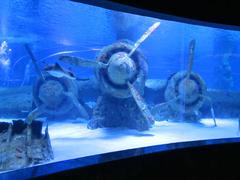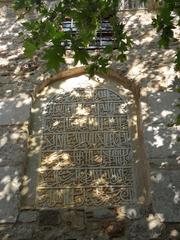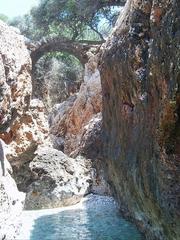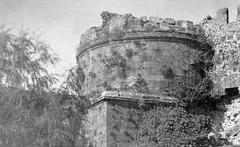Isinda Lycia: Visiting Hours, Tickets, and Travel Guide – Antalya, Turkey
Date: 14/06/2025
Introduction to Isinda Lycia: What to Expect
Perched atop a tranquil hill near the village of Belenli in Antalya Province, Isinda Ancient City stands as a compelling testament to the rich history of ancient Lycia. While less renowned than other Lycian sites, Isinda offers visitors a serene, authentic window into a world marked by unique funerary architecture, democratic traditions, and natural beauty. Here, you’ll encounter evocative ruins—polygonal stone walls, rock-cut tombs with Lycian inscriptions, house-shaped and pillar tombs, and traces of an agora—amidst sweeping views of the Mediterranean landscape.
Isinda’s origins date back to at least the 4th century BCE, as part of the Lycian League, one of the world’s earliest federative political systems. Though a minor member, Isinda’s funerary monuments and inscriptions shed light on the social and religious life of Lycia’s classical era. Its rugged terrain and limited modern development preserve its tranquil atmosphere, making it a favorite for history enthusiasts, hikers on the Lycian Way, and travelers in search of lesser-visited cultural treasures (All About Turkey; Wikipedia; Turkey Tourkeys).
Article Contents
- Introduction
- Historical Context of Isinda within Lycia
- Archaeological Features and Urban Layout
- Location and How to Get There
- Visiting Hours and Ticket Information
- Accessibility and Facilities
- Nearby Attractions and Guided Tours
- Best Time to Visit and Visitor Tips
- Safety and Preservation
- Frequently Asked Questions (FAQ)
- Conclusion
- Resources and Further Reading
Discover Isinda Ancient City: Antalya’s Hidden Historical Gem
Isinda Ancient City is both an archaeological and scenic highlight of Antalya Province. Its well-preserved tombs and fortifications, combined with its peaceful hilltop setting, offer a unique experience for those intrigued by Lycian culture or seeking an off-the-beaten-path adventure. The site’s unspoiled ambiance, unhurried pace, and panoramic views distinguish it from more visited Lycian centers.
Visiting Hours and Tickets
- Summer (April–October): 8:00 AM – 6:00 PM
- Winter (November–March): 9:00 AM – 4:00 PM
- Entrance Fee: None (open-access site; no ticket required)
As an open-air site with few amenities, visitors should bring water, sun protection, and sturdy footwear. There are no restrooms or shops on site.
How to Get to Isinda
- From Kaş: About 6 km northeast; easily reached by car, taxi, or via the Lycian Way hiking trail.
- From Antalya: Approximately 180–190 km southwest; best accessed by car (about 3 hours), or with a guided tour.
- Public Transport: Limited; nearest bus stations are in Kaş or Kalkan, followed by taxi or private transfer to the site.
Note: The last section involves rural roads—use GPS or a reliable map (Property Turkey).
Accessibility and Visitor Tips
- Terrain: Uneven, rocky, and hilly—comfortable, sturdy shoes are essential.
- Facilities: None on-site; bring all necessary supplies (water, snacks, sun protection).
- Weather: Best visited in spring or autumn when temperatures are mild.
- Accessibility: Site is not wheelchair accessible; not recommended for those with limited mobility.
Historical Overview: Isinda in the Lycian Context
Origins and Name
Isinda (Ἴσινδα in ancient Greek, “İsinda” in Turkish) likely derives its name from the Luwian word for “holy,” reflecting its cultural and spiritual significance (All About Turkey). Archaeological and linguistic evidence places its foundation before the 4th century BCE (Wikipedia).
Lycian League Membership & Political Status
Isinda was a member of the Lycian League—an early democratic federation of city-states. Although it lacked an independent vote, Isinda shared representation with neighboring cities Aperlae, Apollonia, and Simena, with Aperlae as the leading partner. This sympoliteia is recorded in ancient inscriptions and highlights Isinda’s modest yet meaningful role in Lycian governance (Turkey Tourkeys; Lycian Monuments).
Urban Layout and Defensive Structures
Strategically located on a hilltop 90 meters above Belenli, Isinda’s city walls were built with large limestone blocks, showing multiple phases of construction and repair. Fragments of these fortifications, wells, and cisterns for rainwater storage remain, attesting to the city’s adaptation to its environment (All About Turkey; HerAntalya).
Funerary Monuments and Inscriptions
Isinda is renowned for its Lycian tombs, particularly:
- House-shaped tombs with inscriptions (on the acropolis)
- Rock-cut tombs from Hellenistic and Roman times
- Pillar tombs (six in total, some decorated)
- Sarcophagi with Lycian and Roman inscriptions
These monuments offer direct insight into Lycian language, religious beliefs, and artistic expression (Turkey Tourkeys; HerAntalya).
Decline and Modern Rediscovery
During the Roman era, Isinda’s population migrated to Antiphellos (modern Kaş), leading to its eventual abandonment (Wikipedia). No systematic excavations have taken place, preserving its mysterious and untouched atmosphere (Lycian Monuments).
Nearby Attractions and Guided Tours
- Antiphellos (Kaş): Ancient theater, tombs, harbor
- Simena (Kaleköy): Castle, submerged ruins, Lycian tombs
- Aperlae: Remote ruins, accessible by boat or hiking
- Xanthos, Patara, Letoon: Major Lycian archaeological sites
Local operators in Kaş offer guided tours, sometimes combining Isinda with boat trips or hiking excursions. Knowledgeable guides can interpret the site’s unique features and the broader context of Lycian civilization.
Best Time to Visit and Practical Tips
- Ideal Seasons: Spring (March–May) and autumn (September–November)
- Timing: Early morning or late afternoon for better light and cooler temperatures
- Photography: Panoramic views and Lycian tombs are particularly striking
- Respect: Do not climb on ruins or remove artifacts; help preserve the site
Safety and Preservation
- Hazards: Uneven ground, loose stones, and overgrown vegetation—watch your step.
- No On-Site Staff: Exercise caution and travel with a companion if possible.
- Preservation: Isinda is protected under Turkish law and is included in the UNESCO tentative list for Lycian Civilization (UNESCO Tentative List).
Frequently Asked Questions (FAQ)
Q: What are the opening hours of Isinda?
A: The site is open year-round from sunrise to sunset.
Q: Is there an entrance fee?
A: No, Isinda is free to enter.
Q: How do I get there?
A: By car or taxi from Kaş (6 km) or Antalya (180–190 km). Hiking is possible via the Lycian Way.
Q: Are guided tours available?
A: Yes, but they must be arranged in advance through local operators.
Q: Is Isinda accessible for wheelchairs?
A: No, the terrain is rough and not suitable for wheelchairs or those with mobility limitations.
Q: Are there facilities on site?
A: No. Bring all necessities with you.
Visual Highlights
Alt text: Panoramic view of Isinda Ancient City ruins atop a hill near Antalya.
Alt text: Close-up of a carved Lycian pillar tomb located at Isinda Ancient City.
Alt text: Map illustrating the route from Kaş town to Isinda Ancient City.
Summary: Why Visit Isinda?
Isinda is a rewarding destination for those keen to experience an authentic Lycian site away from the crowds. Its strategic location, evocative funerary monuments, and tranquil setting provide both historical insight and natural beauty. The absence of an entrance fee, combined with its proximity to Kaş and the Lycian Way, makes it accessible for independent travelers and trekkers alike.
Visitors can connect with the broader narrative of Lycian civilization—its innovative political system, artistic achievements, and blend of indigenous and Hellenistic traditions. Whether you are a history buff, hiker, or cultural traveler, Isinda offers a meaningful and memorable experience in Antalya’s archaeological landscape. Enhance your visit with resources like the Audiala mobile app for guided tours and up-to-date site information.
Sources and Further Reading
- All About Turkey – Isinda Ancient City
- Wikipedia – Isinda (Lycia)
- Turkey Tourkeys – Lycian League and Isinda
- HerAntalya – Isinda Ancient City
- Lycian Monuments – Isinda
- TurkeyTravelPlanner.com – Visiting Isinda
- Property Turkey – Lycian Coast Guide
- UNESCO Tentative List – Ancient Cities of Lycian Civilization
- Archaeotravel.eu – Ancient Lycia
- Petersommer.com – Ancient Lycia
For more travel tips, guided audio tours, and site updates, download the Audiala app and follow us on social media.





